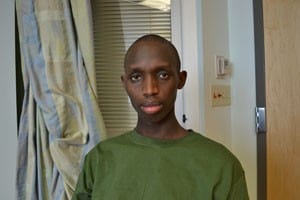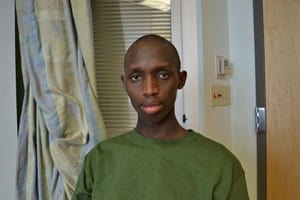‘People Don’t Just Work Here’
| What few details Jean Rugamba knows of the morning of July 20 he has learned mostly secondhand.

Jean Rugamba
He was driving alone, and the roads were wet. He lost control of his vehicle and hit a pole at approximately 70 mph. He was not wearing a seatbelt and was thrown out a window. In the process, he broke his back and severed his spinal cord. He lay there for around two hours before being found. Paramedics transported him to UAMS where his memory picks back up four days later.
“I don’t remember much. I don’t know exactly what happened. That’s what they say happened. They say that they found me like that,” recalls the 25-year old Rwandan who recently graduated from Birmingham Southern College in Alabama with a double major in mathematics and chemistry. Rugamba had come to Arkansas to live with other Rwandan students and work before beginning a graduate program in applied mathematics back in Alabama in the fall.
His injuries included broken ribs and had him on a ventilator when he arrived.
“He had the highest level response our trauma center offers, based on the injuries that the paramedics reported to us,” said Michael Sutherland, M.D., chief of acute care surgery and a trauma surgeon at UAMS.
“It didn’t appear to be something that was not survivable, but it was obvious that he was severely injured and was going to require the full resources of our Level One trauma center.”
The spinal injury resulted in paraplegia, requiring acute rehabilitation care. But the problem for Rugamba was figuring out what would come next as he had no local support network outside of the hospital.

Members of Rugamba’s UAMS care team gathered to wish him well just prior to his discharge to rehabilitation.
“I did not have a discharge plan. I have no family here. So they were thinking about sending me back home. Now, to me that was not an option. Because back home, for me, there’s no way to survive. There are not that many wheelchair-accessible buildings or sidewalks. Because this country is more developed than my country, it’s easier to live here.”
It was through the hard work of UAMS staff, including doctors, therapists and social workers, that post-release care was arranged for Rugamba with UAMS physicians at a nearby facility specializing in rehabilitation therapy. Staff also arranged for a visa for his brother to come from Rwanda to care for him during and after rehab.
“If they didn’t care, if they’d been ‘just working here,’ they could have said ‘the only thing that we can do is get a medical flight and send you home.’”
But they didn’t. Sutherland said that while every circumstance is unique, the effort to help is not.
“We go through extraordinary efforts to help everyone. Everybody has a commitment to the patient. Everyone has a commitment to seeing the patient get well and go home and get back to their lives. It’s good to know that we’re accomplishing our goals.”
For Rugamba, that level of service is self-evident.
“People here don’t ‘just work here;’ they care about the patients. That’s the takeaway, and I’m really grateful.”
The plan is to work through rehab, learning how to adjust to life in a new set of circumstances, and then enroll in a doctoral program at Birmingham in the spring term.
“Those are his goals, and we’re very supportive of it, and I think it’s certainly reachable,” Sutherland said.
“There are a lot of things that could have been worse,” said Rugamba. “I’m grateful that my head was not injured. The fact that I’m talking right now, the fact that I can do what I used to do, that I can go to school, that’s a blessing.”
